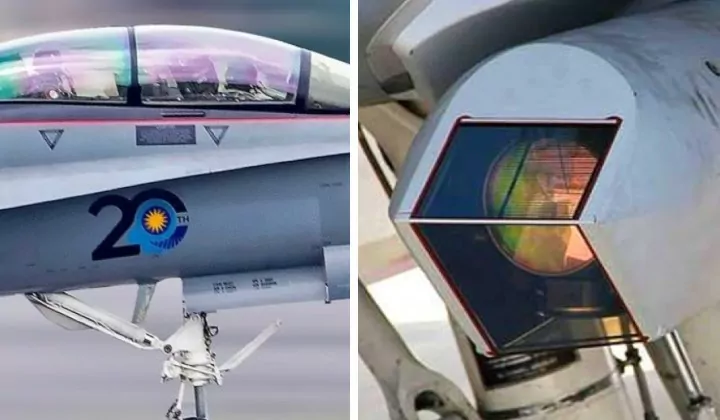US Approves Sale Of RM400 Million High-Tech Eye In The Sky To Malaysia
The United States has given the green light for Malaysia to acquire 10 Lockheed Martin AAQ-33 Sniper targeting pods for its F/A-18D fighter jets.

Subscribe to our FREE Newsletter, or Telegram and WhatsApp channels for the latest stories and updates.
The United States government’s approval for Malaysia to purchase 10 Lockheed Martin AAQ-33 Sniper targeting pods for its fleet of eight Boeing F/A-18D fighter jets has brought the nation’s defence spending and foreign policy into sharp focus.
The deal, valued at approximately RM400 million (roughly $80 million), is intended to modernize Malaysia’s fleet of eight F/A-18D and enhance its operational capabilities.
The AN/AAQ-33 Sniper Advanced Targeting Pods are high-tech cameras for military aircraft that can see from far away, day and night.
These pods are attached to fighter jets and help pilots identify targets accurately from a distance without being seen or getting too close.
Malaysia’s Defense Upgrades Amid Fiscal Constraints and Diplomatic Quandaries
As the government prepares to move forward with the acquisition, it is essential to consider the various implications of this decision and whether the public should be concerned.
The substantial purchase cost, especially during economic uncertainty, raises questions about prioritising taxpayer money.
With the nation still recovering from the impact of the COVID-19 pandemic, some may argue that the RM400 million could be more effectively allocated towards addressing pressing domestic issues such as healthcare, education, and poverty alleviation.
Furthermore, Malaysia’s long-standing principled stance against Israel due to the latter’s treatment of Palestinians adds another layer of complexity to the decision.
While Malaysia has traditionally been critical of Israel’s policies, its acquisition of weapons systems compatible with Israeli technology could be seen as a contradiction.
Moreover, the decision to purchase arms from the United States raises a moral question, particularly in light of the Malaysian public’s boycott of US brands due to the US’s support for Israel in the Gaza conflict.
READ MORE: Five, Including Army Man, Arrested For Threatening McDonald’s Customers In Pahang
jenama US ni derma kat israel jugak ke? atau kita masih boikot membabi buta? https://t.co/eYw94b593B
— amir (@santaIVXX) November 3, 2023
However, it is crucial to recognize that acquiring advanced targeting pods is essential for Malaysia to maintain a credible deterrent against potential threats in the region.
The F/A-18D fleet plays a critical role in safeguarding Malaysia’s national security interests, and the Sniper targeting pods would significantly enhance the aircraft’s capabilities, ensuring that the nation’s armed forces are well-equipped to face the challenges of the modern battlefield.
The US has consistently ranked among the top arms suppliers to Malaysia, alongside other major players like Russia and France.
This reflects the strategic partnership between the two countries and their shared interests in regional security.
Steering Through Stormy Seas: Rebuilding Trust in Malaysia’s Defence Procurement
As the public becomes increasingly aware of the Sniper targeting pod purchase, it will likely spark a thought-provoking debate about the balance between defence needs, economic priorities, and foreign policy principles.
Taxpayers may demand greater transparency and accountability from their elected officials, seeking assurances that their money is being spent wisely and in line with the nation’s values and goals.
This concern is particularly relevant given the Malaysian public’s growing scepticism towards defence deals stemming from problematic acquisitions in recent years.
One notable example is the delayed Littoral Combat Ship (LCS) project by Boustead Naval Shipyard (BNS), which was recently renamed Lumut Naval Shipyard (LUNAS).
The project commenced in 2013 and has faced significant delays and cost overruns.
None of the six ships had been delivered despite an initial deadline of 2019.
The mismanagement of the LCS project has eroded public trust in defence procurement processes and raised questions about the government’s ability to secure value for money in such deals.
The Malaysian government is responsible for engaging in open and honest dialogue with its citizens, explaining the rationale behind the decision and addressing any concerns.
By fostering trust and understanding, the government can demonstrate that it is acting in the nation’s best interests, carefully weighing the complex factors that influence defence procurement decisions in an ever-changing global landscape.
Share your thoughts with us via TRP’s Facebook, Twitter, Instagram, or Threads.





